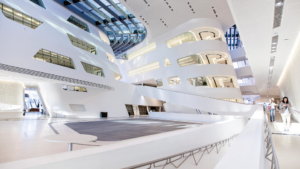
Vienna: The centre of the European biotech world
This year, BIO-Europe, Europe's leading partnering event for the entire biotech ecosystem, will take place in Vienna. From 3 to 5 November, the industry's most important decision-makers will meet here to negotiate partnerships, contracts and financing, and to learn about the latest developments and trends. With over 5,700 participants from 60 countries, 2025 is set to see a record number of delegates, sponsors, exhibitors and presenting companies.
BIO-Europe attracts experts from all areas of the biotechnology universe and all sizes of companies – from promising start-ups seeking strategic partnerships and investments to successful SMEs exploring new customers, and executives from global players scouting for assets to complete their product pipelines. Vienna contributes historical splendour and architectural magnificence to the event, with a welcome reception at City Hall and an evening networking reception at the Hofburg. At the Austrian pavilion LISA – Life Science Austria, operated by LISAvienna, about 100 companies will be represented.
Life Sciences Hub Vienna
As Austria’s life sciences hub, the metropolis is a worthy venue for the congress. Boehringer Ingelheim recently announced that a drug developed in Vienna to treat a specific form of lung cancer has been approved in the USA, China and Japan. This offers new hope to 40,000 patients newly diagnosed worldwide each year, who now, for the first time, have a targeted treatment option. Boehringer established its first foreign subsidiary in Vienna over 75 years ago. Their Regional Center Vienna is responsible for 33 countries in CEE and Central Asia, and employs about 3,200 people. The company operates the central pillar in its global oncology research network and a manufacturing plant here. Novartis, Octapharma, Sandoz and Takeda also operate significant production facilities in Austria. Each of the top 20 biopharmaceutical companies in the world has a sales branch in the Vienna region, with many also conducting clinical trials here. In total, Austria’s life sciences ecosystem encompasses companies with 73,400 employees and academic institutions with more than 24,300 life-sciences related employees as well as 68,300 life sciences students at universities, providing the sector with talent. Great infrastructure is another key driver for success. New centres for translational and precision medicine are being built by the Medical University at the campus of Vienna General Hospital, one of the largest hospitals in Europe. Since recently, the Vienna BioCenter houses a high-profile institute for artificial intelligence (AI) in biomedicine called Aithyra. Overall, this campus is home to around 40 biotech companies and six academic research institutions. Over 2,800 people from more than 80 countries work here.
Organoids, iPSCs and CRISPR
Surprising new developments are presented at BIO-Europe. Organoids, iPSCs and CRISPR are just a few of the buzzwords that crop up in the search for therapies for previously incurable diseases. Boehringer Ingelheim recently signed a cooperation agreement with HeartBeat.bio to develop gene therapy solutions for inherited heart muscle disorders. The company uses induced pluripotent stem cells (iPSCs) to create human heart chamber models that replicate key features of genetic cardiomyopathies. Such tools allow drug candidates to be tested on them.Innsbruck-based company Angios Biotech specialises in developing cell-based treatments for vascular diseases, leveraging blood vessel organoids. This approach has the potential to directly advance regenerative transplantation medicine, to allow identifying new drug targets, but also to build a model for assessing and predicting the vascular toxicity of novel drugs. Angios and HeartBeat.bio will both be available for partnering meetings at BIO-Europe.
The start-ups dawn-bio and ABS Biotechnologies will take the opportunity to present their fields of activity at the congress. Dawn-bio’s goal is to increase the number of healthy live births in IVF. ABS Biotechnologies from Lower Austria uses human iPSCs to identify potential cardiac side effects in drug development at an early stage. This supports selecting the right drug candidates for clinical trials to provide patients with safer treatments. CRISPR screenings allow a better understanding of disease mechanisms, to shed light on the mode of action of drugs, and to identify new drug targets. If you are interested in such topics, you should look out for companies such as bit.bio discovery or Myllia Biotechnology at BIO-Europe. Myllia Biotechnology will be presenting its technology, combining CRISPR screening in primary human cells with single-cell RNA sequencing. This contributes to nominating the best possible targets for drug discovery campaigns. Bit.bio discovery on the other hand enhances drug discovery programmes by leveraging cutting-edge CRISPR technology within the realm of human iPSC-derived models.
Among the companies presenting at BIO-Europe also are Cycuria Therapeutics, Proxygen, RIANA Therapeutics and aitiologic, which are involved in the detection or treatment of cancer and other life-threatening diseases. The preclinical oncology start-up Cycuria from Graz is developing protein-based therapies against haematological cancers. The therapy is designed to selectively destroy cancer cells and their progenitor stem cells while preserving healthy blood formation. Proxygen is relying on molecular “glue degraders” against difficult-to-drug or completely undruggable targets of severe diseases. These are designed to lead to the breakdown of disease-causing proteins. MSD values the approach at up to US$2.55bn as part of a strategic partnership. RIANA Therapeutics, a spin-off of the University of Veterinary Medicine Vienna, is developing active substances against carcinogenic protein-protein interactions (PPIs). The company can screen for substances that disrupt oncogenic PPIs. Aitiologic applies AI to diagnostics by analysing cell-free DNA released into the bloodstream when cells die. The company combines liquid biopsy testing – originally developed by Siemens Healthineers and exclusively licensed to Aitiologic – with cloud-based interpretation. The approach promises major advances in non-invasive prenatal and oncology testing.
Advice and support for companies
The Austrian Business Agency (ABA) will also be represented at BIO-Europe. International companies evaluating Austria as a possible business location and setting up in Austria can obtain free-of-charge advice from the agency. Services include market and industry research, assistance in choosing a location, legal information ,and networking with research institutes. Funding for innovative companies is provided by the Austrian Research Promotion Agency (FFG) and Austria Wirtschaftsservice (aws). The FFG Life Science Programme supports R&D projects across all technology readiness levels. Via the aws LISA Programme, start-ups have access to aws Preseed and Seedfinancing. The aws AplusB Scale-up Programme finances incubators supporting academic start-ups, and the new aws Spin-off Initiative supports them in accessing private venture capital. Growing companies are offered additional options, such as the Venture Capital Initiative, founder and SME funds, guarantees, and loan instruments. The country’s regional life science clusters unite under the aws LISA umbrella brand, showcasing Austria’s strengths in life sciences internationally. Businesses also benefit from Austria’s attractive tax system. A 14% R&D tax allowance and a maximum corporate tax rate of 23% are key location advantages.
=> Discover opportunities with Austria at BIO Europe’s Exhibition Hall, Booth #C32
Contact:
LISA Life Science Austria
l.doppler@aws.at | lifescienceaustria.at
Austrian Business Agency (ABA)
office@aba.gv.at | investinaustria.at/en
This Advertorial was originally published in European Biotechnology Magazine Autumn 2025.


 ABA Austria
ABA Austria Oncomatryx Biopharma S.L.
Oncomatryx Biopharma S.L. WU Vienna University of Economics and Business Administration
WU Vienna University of Economics and Business Administration